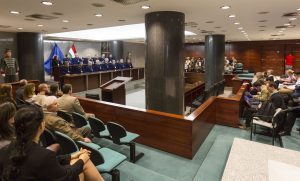Unconstitutionality by omission manifested in non-conformity with the Fundamental Law found in the regulation of the Act on the Hungarian Academy of Sciences
2022. November 15.

The Constitutional Court has held in its publicly pronounced Decision that in amending the Act on Scientific Research, Development and Innovation and the Act on the Hungarian Academy of Sciences, the National Assembly has brought about unconstitutionality by omission manifested in non-conformity with the Fundamental Law by failing to regulate the property relations between the Eötvös Loránd Research Network and the former operator of the research network, the Hungarian Academy of Sciences, in accordance with giving effect to the principles of legal certainty and the right to property. For this reason, the Constitutional Court called upon the National Assembly to discharge its legislative duty in this regard by 30 June 2023.
The Constitutional Court, acting of its own motion, held that the National Assembly induced unconstitutionality by omission manifested in non-conformity with the Fundamental Law in Sections 45 to 46 of Act LXXVI of 2014 on Scientific Research, Development and Innovation as amended by by Act LXVIII of 2019 and in Section 3 (1a) of Act XL of 1994 on the Hungarian Academy of Sciences. This unconstitutionality by omission had been brought about by the failure of the National Assembly to regulate, at the time of its establishment, the property relations securing the operation of Eötvös Loránd Research Network with the Hungarian Academy of Sciences, which had previously been responsible for its operation, in Sections 45 to 46 of Act LXXVI of 2014, as amended by Act LXVIII of 2019, and in Section 3 (1a) of Act XL of 1994 on the Hungarian Academy of Sciences, in accordance with giving effect to legal certainty and the right to property.
The Decision further testifies the Constitutional Court’s findings that in the context of the application of Section 42/C (3) of Act LXXVI of 2014 on Scientific Research, Development and Innovation, it shall be a constitutional requirement that in the process of taking decisions on scientific matters, freedom of science should prevail and the method and regulation of , decision-making should be in accordance with the constitutional value of scientific freedom.
The procedure of the Constitutional Court was prompted by the petition of more than a quarter of the Members of the National Assembly seeking an ex post review of conformity with the Fundamental Law and the constitutional complaint lodged by the Hungarian Academy of Sciences, in which the petitioners proposed the annulment of several sections of the Act amending certain Acts necessary for the overhaul of the institutional system and financing of research, development and innovation.
The legislator placed the research centres and institutes previously under the control of the Hungarian Academy of Sciences, partly owned by the Academy and partly financed from the budget, under a new management structure. Under the impugned legislation, the Academy is responsible, among others, for securing the right of use of the assets owned by it and used by the research centres. In the petitioners’ view, this was a deprivation of the Academy’s right to dispose of its property, and the regulation unconstitutionally restricts the Academy’s constitutionally protected property as purpose-limited public assets.
In its Decision, the Constitutional Court explained that it does not have the competence to review the efficiency of the performance of public duties in the context of a regulation, and the mere fact that the State intends to continue to perform a public duty through another body does not in itself constitute an infringement of the Fundamental Law. However, it is the duty of the Constitutional Court to hold the legislator to account for the requirements associated with the nature of the institutional system (in this case, scientific freedom and the right to property).
The Constitutional Court has concluded, inter alia, that the allocation of the Academy’s purpose-specific assets to another body is constitutional if the scope of the assets is precisely defined, to the extent necessary and subject to judicial review. The new body which effectively uses the assets not only acquires the rights to the assets but also bears the burdens thereof. Furthermore, the transfer of the right to use the property, which falls within the scope of the public duties, may only take place for a limited period of time. The Decision indicates that the legislation under review does not contain these constitutional requirements, but concludes that the Constitutional Court does not have competence to establish them. Therefore, the Court found that the National Assembly had created unconstitutionality by omission manifested in non-conformity with the Fundamental Law by failing to properly regulate the existing and future property relations in the reorganisation of the research institutes previously operated and managed by the Hungarian Academy of Sciences as performing its public functions into a new management structure. The assets of the Hungarian Academy of Sciences are non-State assets limited to a purpose, within which the property acquired by the Academy (such as immovable property and intangible assets) is subject to property protection under Article XIII (1) of the Fundamental Law. The State must create a regulation which also ensures the conditions and guarantees necessary for the performance of public functions.
The Constitutional Court has also rejected or dismissed the petitions seeking a finding that the contested provisions of the law are contrary to the Fundamental Law and annulment of those provisions.
Balázs Schanda, Marcel Szabó and László Salamon, Justices of the Constitutional Court, delivered concurring reasonings to the Decision.
The Decision adopted by the Constitutional Court can be consulted by following this link >>.